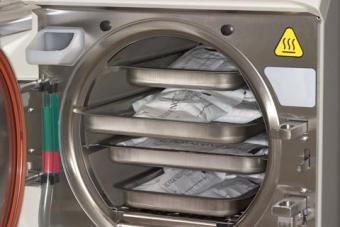
Hepatitis and inking can be a deadly combo. Hepatitis can be transmitted easily through dirty or shared tattoo needles. While autoclaves and other sanitary practices are used frequently to ensure this doesn't happen, it is still up to the consumer to check out the tattoo shop and be sure it's clean before you get inked.
What Is Hepatitis?
Hepatitis is a highly infectious blood borne virus that attacks the liver and renders it unable to function. The virus comes in many strains designated from type A to type E, but it is hepatitis B and C that are the most direct risks to anyone involved with tattoos.
Once infected, the type B virus takes an average of 120 days to incubate before it can be detected, while hepatitis C tends to incubate at a quicker rate, usually about 45 days on average.
Hepatitis Exposure
While hepatitis can be spread through tattooing, there are other ways of transmitting it as well. Doctors, dentists, lab technicians and a host of other medical personal all run the risk of exposure to one of the many forms of hepatitis. IV drug users run a higher than average risk of contracting the disease as well, especially if they share needles with other users.
Considering the fact that any form of hepatitis causes the eventual loss of all liver function, resulting in death, there is certainly no way you can be too careful about avoiding exposure to this disease.
How Is Hepatitis Transmitted?
According to the tattoo shops have the potential to spread the hepatitis virus, but there are no current studies to show how likely this is to occur. Because hepatitis is transmitted through blood and other bodily fluids, it can easily be passed from one person to the next through the use of contaminated tattoo guns, machines, needles, table surfaces and even transmitted directly by an infected tattoo artist.
Hepatitis can also be transferred by using the same cap of ink from one client to the next; tattoo ink must be discarded after a single client use. This is definitely one area where it does not pay to economize.
It may also startle you to learn that the hepatitis virus can remain alive and active on tattoo equipment and other surfaces for up to two months. Just imagine the number of people who could potentially become infected by just one careless artist/shop.
Interesting Facts
- Persons infected with hepatitis are ineligible to donate organs, blood or tissues.
- Anyone receiving a tattoo is not allowed to donate blood for six months afterward, and should be tested for the virus prior to donating.
Proper Sanitation/Sterilization
To avoid risk of transmitting hepatitis a tattoo shop should follow specific procedures. This includes impeccable sanitation and sterilization practices to reduce the risk of speading not only hepatitis but other blood borne diseases such as HIV and tetanus.
Step One

Prepare and set up for a new tattoo by taking the following precautions:
- Sterilize the work area with a strong disinfectant. Once disinfected, cover the work surface with fresh paper or plastic sheeting to catch any droplets of body fluid that may be emitted during the tattoo process, including blood, saliva and sweat. All tattoo items to be used should be freshly unwrapped, either from their factory seals or from sealed sterilization bags that have been properly run though an autoclave.
- The tattoo artist should sterilize themselves as well, thoroughly washing both hands before the process begins and wearing protective gloves and a facial mask while administering the tattoo.
Step Two
Assuming all precautions have been carried out prior to the actual tattooing, clean up after the tat is finished is the next crucial step in stopping the transmission of diseases.
- All used needles, tubing and inks should be considered hazardous waste and discarded properly. Soak reusable items and equipment in a disinfecting solution, then seal them in sterilization bags, run through an autoclave at the proper temperature and time duration. Items should be stored still sealed until it's time for their next use. Sterilization bags have an indicator strip that turns color when proper sterilization has been successfully carried out.
- Completely disinfect the tattoo area. Throw away any toweling that has been used to wipe off the fresh tattoo.
- Use a topical disinfectant gel on the tattoo itself, and the cover area with a sterile bandage.
- After care is also important and the person receiving a tattoo should take meticulous care to keep the area clean until healing is complete, and throw away any scabbing as well.
Preventative Vaccinations
Although it is not yet routinely used in the tattoo industry, there is a vaccine available to inoculate workers commonly exposed to the hepatitis B virus, but as yet, there is no vaccination against hepatitis C. Discuss getting a tattoo with your physician beforehand to find out if you should receive the hepatitis B vaccine. There is no medical reason anyone wishing to receive the vaccine should be denied.
A Cautionary Tale

Actress Pamela Anderson and then husband rocker Tommy Lee thought it would be romantic to get tattooed together. As man and wife, they shared everything else together, so what would sharing a tattoo needle hurt?
As it turned out, it hurt Pam a lot. Neither were aware that Tommy had already contracted hepatitis C, and so the disease was transmitted to Pam via his contaminated blood on that shared needle.
The moral of their story? There's nothing romantic about hepatitis and inking, so never risk sharing a needle with anyone, no matter how much you trust them. It just isn't worth the risk to your health and life.







